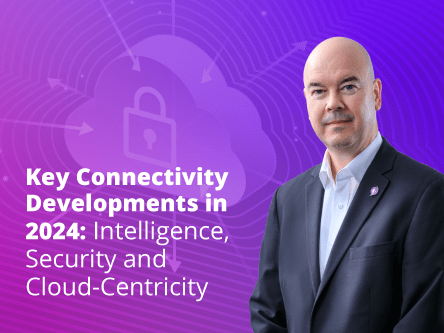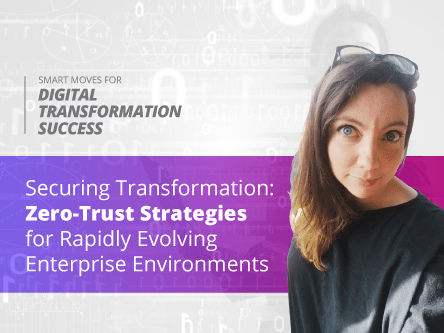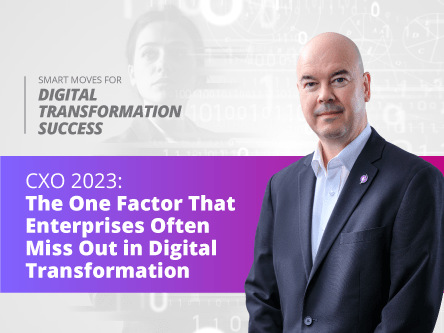Epsilon had the honour of hosting CEOs, CIOs and business leaders at its “CXO 2023: Smart Moves for Digital Transformation Success” event at the Royal Society of Arts (RSA) just off the Strand in central London. The event was an opportunity to network and share insights about aligning technology, transformation, and business outcomes.
Jamie Davies, Customer Experience Director at Epsilon, kicked off the panel discussion by framing the conversation around CIO challenges, before handing over to Dr Lucy Green, CEO at Larato, to host the conversation. Panellists from Epsilon, Johnson Matthey, London Internet Exchange (LINX), and Microsoft joined in a lively conversation that touched on transformation strategy, networking, and artificial intelligence. Dr Lucy Green began by asking the panel where to start with digital transformation to make it a success.
“Enterprises don’t have to have a digital strategy to realise value from technology. I think at the highest levels in an organisation, there’s a resistance to having a digital strategy because it often means cost and new investment. If you can focus on real business outcomes, there’s a greater chance of success and seeing benefits that are understood across the business,” said Aidan Hancock, CIO at Johnson Matthey. “No one really wants to talk tech. They want to talk about business outcomes.”
Successful transformation hinges on buy-in from across an organisation that requires the C-suite to recognise business value in the technologies and solutions an enterprise wants to deploy. The panellist agreed on the need for greater focus on benefits, but Nicola Gallacher, Cloud Solutions Architect at Microsoft, added that this requires nuance and knowing how to communicate across an organisation.
“For digital transformation to work, there needs to be a balance between conversations around the technologies involved and the business outcomes. It depends on who you’re speaking with, and conversations happen at different levels. To get buy-in across an organisation, you have to know your audience and what drives their decision making,” said Gallacher.
On the networking side, success in transformation is rooted in simplicity. Kurtis Lindqvist, CEO at the London Internet Exchange (LINX), noted that there is greater complexity in networking than most CIOs have ever seen. There are more technologies, models and options compared to the legacy MPLS world, and that requires new skills internally within enterprises, as well as service providers that are in tune with enterprise demands.
“I’ve done my time building networks in my career but now as a CIO, I want that complexity to be hidden. I don’t need to see the details, but I want to ensure that my network services just work. I want flexible bandwidth and I want a reasonable level of reliability. A good network is one that I don’t have to think about,” said Hancock.
Mark Daley, Director of Digital Strategy and Business Development at Epsilon, shared his experience in transforming Epsilon from a legacy excel spreadsheet-based operation to a digital and application-centric network provider. His key focus areas were visibility into inventory, configurability of services, and overall manageability of networking. Daley highlighted that Epsilon was one of the first network providers to offer software development kits (SDK) and present out solutions with a Network-as-a-Service (NaaS) model.
The conversation turned to the next evolution of networking and the influence of AI on enterprise networking. Lindqvist said, “15 years ago we were talking about digitalisation, and today we’re talking about how to get value from digitalisation. The value is in enabling and supporting business outcomes. What keeps me up at night is that 30 years ago, tomorrow looked like today, only faster. Now with artificial intelligence and other technologies, tomorrow could be completely different from today. That’s exciting but it is also a challenge.”
Hancock noted that after decades of experience in IT, there are very few technologies that are as exciting as AI. He said, “You tend to get jaded after a while but then you play with ChatGPT and you can see the potential of it, even if it is still in its infancy.”
Daley added, “Over the last 20 years, the telecoms industry has had some degree of artificial intelligence but nothing on the scale we’re seeing today. I’m excited to see how AI can support network interconnection and how two NaaS providers can work together. AI can accelerate the integration of two networks by recognising a common challenge, and immediately providing a solution that means interconnection is far faster than we see today. That creates a seamless experience and enables NaaS providers to move with greater agility when serving enterprise demands.”
If the result is optimised experiences and greater agility, AI will benefit the entire IT ecosystem, deliver business outcomes, and show the benefits of digital transformation. The key is aligning technology, transformation and business success.
The evening concluded with a networking session and a few drinks in the beautiful surroundings at the RSA. The team at Epsilon would like to thank our guests for attending as well as our panellists for participating. It was a great event, and we were extremely pleased to see everyone in attendance.
Please follow Epsilon on LinkedIn for news and content, as well as information about other Epsilon events in the future.







